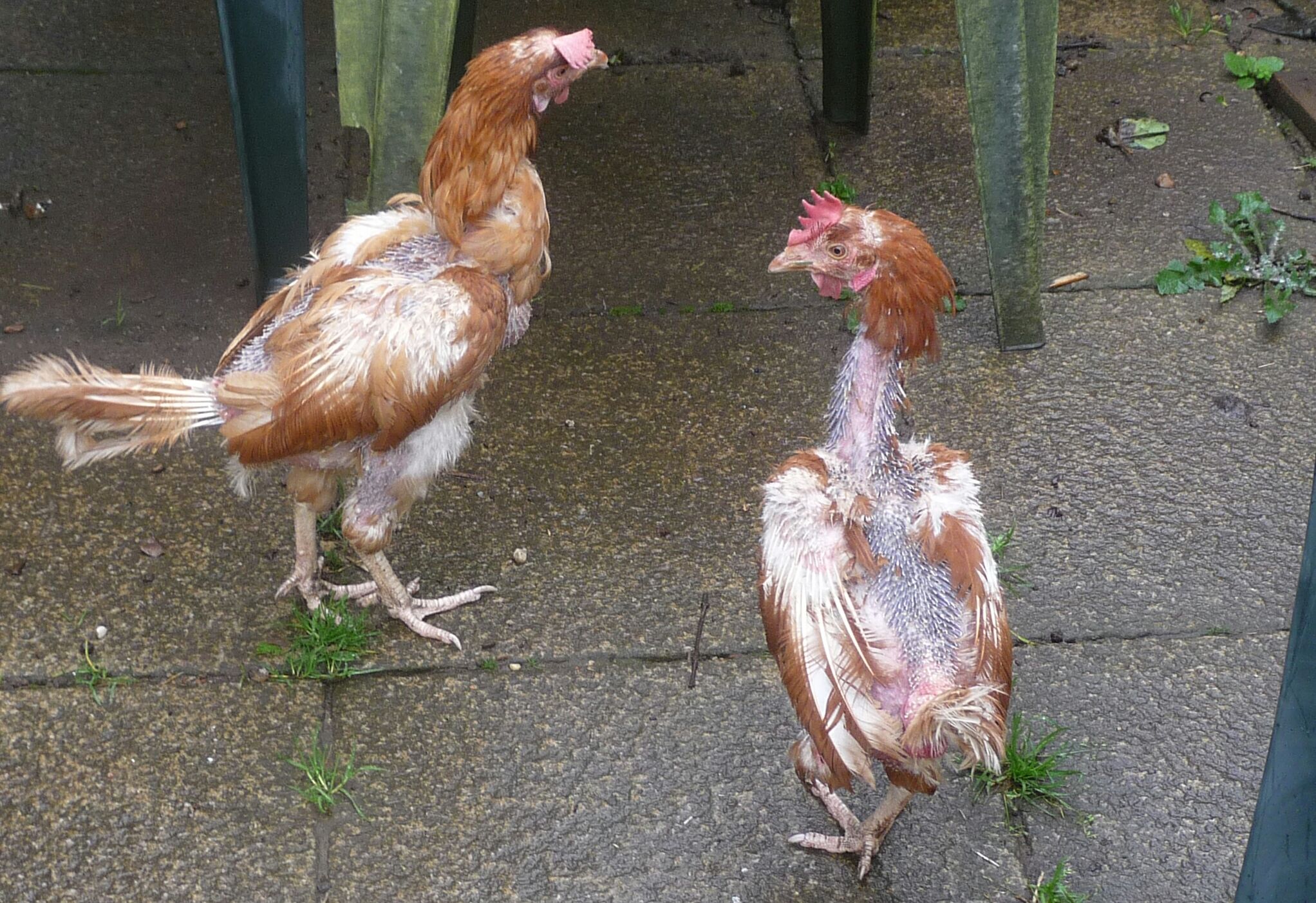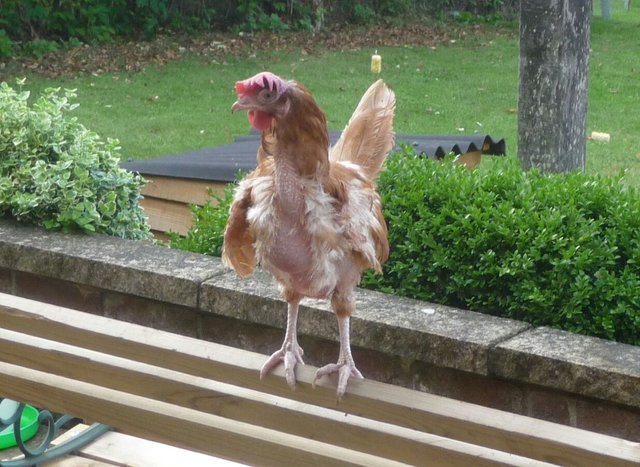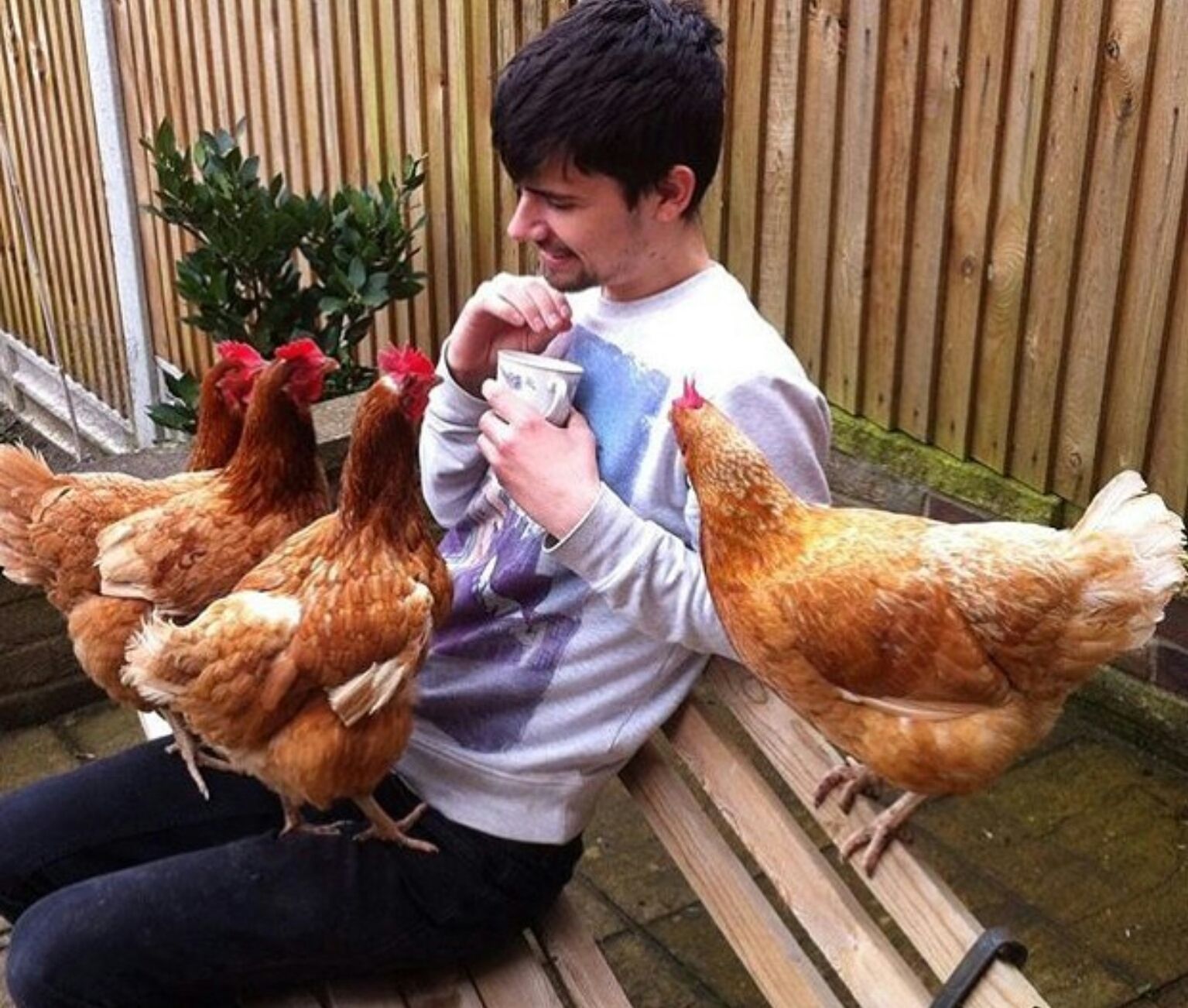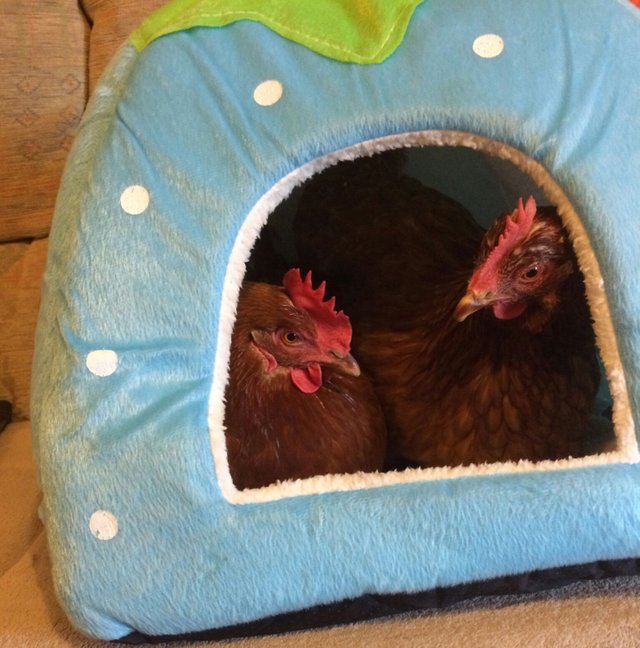Taking Back Control of Our Food Production: The Chicken and Egg Problem
My chicken keeping journey has also been a journey of discovery into how the chicken farming industry works and there is even more to it than the expected cramming of animals into small spaces.

Meet Dolly and Tulip ex battery hens. Photo courtesy of Nicky Cullum
The Egg Industry
I'll start at the beginning with egg farming. Commercial egg layers aren't a breed of hen as we know it. The are what is called a hybrid, meaning that they are a cross breed of certain breeds which hatch a bird that serves a particular purpose. In this case they hatch chicks that can be visibly sexed at hatch and the hens will lay a large egg nearly every day. It sounds pretty good until you realise the consequences of this on the chickens.
The first consequence is to the cockerel (male) hatchlings. Because hens that lay well are general a lighter bodied chicken, the males aren't deemed worth raising to adulthood for meat. So they are killed at hatch. The pullet (female) hatchlings get to grow up, but there's a catch for them as well. Once they've been laying for about a year, they are usually disposed of even if they've been raised truly free range. The reason given is because their egg quality starts to deteriorate, but the reason for the deterioration is not usually mentioned.
In a standard breed hens will lay for a season, then have a short break while they moult. When they start laying again, it's like their system has had a bit of a reset and their egg quality goes back up. Hybrid layers don't get this reset. They just keep laying eggs which takes a huge toll on their bodies and they often end up dying from complications caused by this at 2-3 years old.
There are people who rescue ex battery hens to give them a chance to live out the rest of their lives as they should have started. In the UK the British Hen Welfare Trust rescues thousands of hens when the farms have finished with them and get them rehomed. What they do is wonderful and a few lucky chickens get to experience some health and freedom while they demonstrate just how terrible the conditions they're farmed in are. However, this is just dealing with the end result of the farming practices and the next step is to stop them being farmed like this in the first place.

Rescued ex battery hen Titch on arrival at her new home. Courtesy of Nicky Cullum
I've had the pleasure of meeting on Instagram a wonderful mother and son team, Nicky and Peter, who decided to take on some ex battery hens. They have been kind enough to let me use these photos of their girls. It was Peter's idea initially to rescue these hens and see them recover as he recovered from illness himself. I thoroughly recommend visiting Nicky’s account to see these characterful girls yourself.

Dolly, Tulip, Titch and Ginger loving their new companions! This is a favourite photo of mine where they seem to gaze adoringly at Peter. They wait for him on this bench to come out with his morning tea! Sadly Tulip and Ginger have already succumbed to the tolls that high production laying put on their bodies. Photo courtesy of Nicky Cullum

Now pampered chickens Dolly and Titch enjoy their giant strawberry! Photo courtesy of Nicky Cullum
The good news is that some countries are banning caged egg farming and in Denmark, @frugallady was telling me, cage eggs are rarely sold as there is little demand for them. This is a great sign that something is working. However, barn laying chickens don't fare much better and the definition of “free range” is often abused, leading to a more recent classification of “pasture raised” to describe a truly outdoors, free range lifestyle.
The Meat Industry
As it's been decided that meat birds need to be bigger than laying birds, instead of growing out the cockerels from the egg layer production for meat they breed another hybrid. There are quite a few large chicken breeds, but they are slow growing. After all they have a lot of growing to do. So the industrial meat bird is a cross between a heavy meat breed and a fast growing breed to get the biggest bird they can as quickly as possible. These chickens are ready for slaughter in just 7-9 weeks in most cases 12 weeks for a larger roasting chicken.
From the start of their lives these chickens will eat so much that some will eat themselves to death before they reach maturity. They have a very high mortality rate. Many will also end up lame before they make maturity because their bodies can't handle the rate of growth. Some farmers will limit their food intake and allow them more free range and this does improve both the mortality rate and lameness, but I still question if this justifies a hybrid created just for meat when so many layer cockerels are being killed at hatch.
To give you an idea of the rate these chickens grow, a lady rescued a meat hybrid female and let her live out her life on her rescue farm. She actually rescued three I believe, but only one, Marshmallow, lived for any length of time, if you can count 6 months as lengthy in any way. At 5 months old she weighed a whopping 10kg (22lbs)! She struggled to walk on anything but flat ground and in the end her heart gave out. I do believe there laws to prohibit you from growing these birds past a certain age, but this doesn't address the moral implications of purposely breeding an animal knowing that this will be their quality of life.
Finding Solutions
So are there any solutions to help change these ways of farming and breeding chickens? I believe there are, but as usual I don't believe it can be done with just one solution.
Starting small I would encourage people to keep chickens or another form of poultry. Lots of people keeping them in small numbers would certainly make an impact. The only problem with this is as the chickens get older and stop laying then they may not have the room to replace them. Maybe some people could cull them for the meat, but most people would struggle to do that to a companion that has provided food for so many years. It seems only fair to return that favour with the chance to retire. This could be a way chicken rescuers who have the land can come in. I hope that one day I could do this myself. You see chickens have more use to them than laying eggs. They are also useful in orchards for helping keep weeds down and breaking the cycles of pests that affect the trees and they are a great help when it comes to preparing land for planting for the same reasons.
You could say that we have to farm in cramped conditions to be able to provide enough for our high population demands, but I believe that's just because we're doing things wrong. Herein lies the problem with monoculture farming. We don't have enough room on the land because each section is being used for just one thing. The aforementioned orchard is a prime example. Instead of having your orchard and chicken farm separate, why not put chickens in the orchard? That will reduce and maybe even eliminate the need for pesticides and herbicides. It will also reduce the need to bring in so much feed as they will get most of it from the bugs and plants in the orchard. Any feed purchased will go through the chicken digesters and be returned as a fertiliser for the trees, also reducing fertiliser costs. You've also combined the land from both chickens and orchards and could theoretically extend the orchard, growing even more trees. In this way production is expanded for the same amount of land used.
Here's another idea. The Vermont Composting Company make compost from the locals’ organic waste. They also sell eggs from chickens that are fed purely from foraging in the compost and some areas of grass on the property. The company itself is in the composting business, but the chickens they use to help with the composting process also give them another product to sell. Once again making extra uses of the space given.
So if we multipurpose the way we do things there's no reason why we can't allow the chickens to have space to roam. Hybrids aren't necessary and roosters can be the meat birds.
You can read previous posts in this series here:
You can also find us on:
Instagram: https://www.instagram.com/minismallholding/
Facebook: https://m.facebook.com/minismallholding/
YouTube: https://m.youtube.com/channel/UCBwcsmyIkW_hIEJdLUSd44g
I dived a little bit into this topic just yesterday. I was doing research to decide on our permanent poultry set up and what is the best and most humane way of doing it.
Permaculture and permaculture like systems are the future of farming. We as humans have been taking, taking , taking and it shows in the quality of our food.
One thing I would add is changing laws in urban areas (and homeowners associations) to allow for the keeping of backyard flocks. This isn't really a problem in the U.K but in the U.S. it's usually illegal
I never looked into keeping chickens when I was in the UK still, but I suspect there are lots of areas where they will ban you fron keeping them there too. I feel anything we might want to implement we'll have to fight for, whether it's the authorities or just general mindsets as many don't like change.
I certainly hope that permaculture like systems will be the future of western farming. Its still very much the way in many other countries.
Will you be farming poultry towards a business side of things or just for your own and immediate family/community?
When I did reading on it it seemed much more widespread in the U.K. legally speaking but who knows. We will be raising them mostly for our family and pets. I would like to sell babies and eggs though but certainly not a big business
I'm pretty sure most of the towns wouldn't have problems keeping a few hens, but city areas might be more iffy. In Australia you can usually keep some, but limits are imposed in most areas.
even most towns don't allow it! I live 5 minutes outside a very small rural town and if I lived in town I wouldn't be able to have them! It's crazy
The treatment of the animals in the dairy business is very similar. They shoot them up with hormones destroy their bodies for max production and then dump them and any new born boys...it is very sad. (why I drive 4 hours round trip to a kind grass fed dairy. ) Very thorough article. I hope it makes someone wakeup out there that it should. It was not an easy article to write...i appreciate your passion!
I'm psyching myself to look into that side of farming next. It's not something I've had personal experience in though, so I'll need to research it a bit more.
Thankfully we have a grass fed dairy provider for the local supermarket chain here, so don't have to make a big journey. The supermarkets are also starting to supply grass fed beef, but we're not big beef eaters now anyway.
The reason I stay to grass beef is the omega profile far better than chicken. ~^~ We actually love chicken but without having my own now to butcher it is unfortunately no longer on our menu. :/ Fortunately, one cow goes a long way so we never starve by any means. :) I so enjoy your writing and I look forward to our next interaction!
Have a fantastic weekend!
Melissa
Thank you. Have a beautiful weekend yourself. 😊
This is a really excellent post, people have got to begin to consider all aspects of where and how their food is obtained. The welfare and humane consideration of animals needs to be in the forefront of the effort to change current factory farming practices🐓
Thank you. Agreed on all counts and I think there are so many ways we can make it work.
For sure one reason we have our own chicken. In my early garden days, I went to a chicken farm to get poop and was so disgusted that I broke up operation poop haul after just a few minutes.
Leghorns are often used as layers and the boys as frying chicken since they don't get so big and cook through faster.
But of course, time is money and heritage chickens just take longer to reach maturity.
Followed you :)
I don't think I could have stomached the chicken farm either!
They sometimes have leghorns and australorp here sold as layers, but they have have been hybridised and aren't the purebreds, so they end up with those same hybrid problems. I think the term they use is commercial leghorns as opposed to purebred leghorns.
Yes, it always comes down to money over ethics. That's why I advocate the multiple income streams to balance things out. Of course for some they'll always want more.
it is hard to make a living from farming. People are so used to buying food cheap and aren't aware of quality and such. Also, we are using so many eggs on a daily basis. The brainwashing that we need tons of animal protein is partly to blame. Don't get me wrong, I do eat animal protein, but not 3 times a day - or even every day for that matter.
To be honest I don't think things are quite as extreme outside of the US on the protein brainwashing side and the extreme differences in the cheap and nasty food verses good food. I recently read an article on how cheap meat can be over there and I was gobsmacked!
When I was in England still, organic food and free range was becoming more available and the price of it wasn't a great deal more than non-organic. When we arrived in Australia I struggled to get organic and when I could it was often double the price of standard. However, cheaper ranges of food were still not as cheap as you'd get in the US, which means we're probably not as averse to paying a bit more for decent food.
We also have a lot more campaigns advocating eating your fruits and veggies. Apart from the odd adverts for meat, the latest of which is advocating pork, meat is not really pushed as necessary. Not that they probably need to in Australia where the BBQ is king!
Yes. Food and meat, in particular, is very much subsidized in the US. But it must be in Europe now as well. We noticed the last few times we visited Germany that food had gotten to be comparable to US prices.
There is a big movement of small farms and permaculture and all of that. But for example, just paying rent in Southern California can be more than a person can make earning minimum wage.
A supermarket chicken costs between $3 and $5. A free-range organic chicken costs at least $25. Of course, people are going for short-term cheap. Longtime consequences -health, pollution, animal rights and such - be damned... Too much to think about if you are in survival mode.
I think $5 would be the cheapest you'd get a small chicken here if there was a special offer on. Free range organic would be $30ish (Australian dollars) and free range is usually about half that. Meat prices are rising rapidly at the moment though. It made me laugh recently when the price of beef shot up because China was buying more, so we were having a shortage. A great example that there is no interest in looking after your own first then selling the excess.
yes. money makes the world turn around......
Excellent informative write up... thanks!
Thank you. 😊